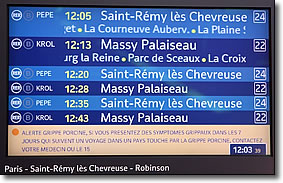 |
Mobile Phones in France | |
| Using your non-European mobile phone in France can be complicated and/or expensive, but there are other, cheaper ways to stay in touch. | ||
|
Use |
|
Three ChoicesYou're going to France and you need to stay in touch with people at home and/or in France. You need your phone to work! You have three choices: (1) Buy international roaming from your home phone company; (2) Buy short-term phone service from a French phone company; or (3) Buy an MVNO Wifi-everywhere service (without phone service) and stay in touch by email, and call-and-messaging apps. 1. Your Home Mobile Phone CompanyMajor mobile phone companies offer roaming plans that allow you to use your phone outside your home country, using the same phone number you have at home. The Good:Convenient! You tell your home country phone company to turn on international roaming, and you use your phone much as you do at home. Friends call your normal number and connect with you (but they may incur international calling charges). The Not-So-Good:Horror stories abound of people using their phones abroad as they do at home, then receiving gigantic roaming bills in the hundreds or even thousands of dollars. One major US company offers a flat-rate US$10 fee per day on any day you use your phone abroad, with "unlimited" use for that price. But...what day WON'T you use your phone for keeping in touch, making reservations, looking up transport or sightseeing schedules, finding your way using GPS in strange places? Thus, on a two-week trip, your bill may be $140. There are cheaper ways to stay in touch. 2. French Mobile Phone CompaniesFrance has four major telephone/Internet companies: Bouygues Télécom, Orange, SFR and free mobile. Each offers short-term, "no-contract" voice call/text/data plans for international visitors. All have convenient shops at which you can buy a SIM card for your phone and have it installed by a technician, or you can download the company's app and use an eSIM (see below). Also, the ubiquitous Relay convenience stores in France sell mobile SIMs from the big companies. You'll see a Relay in every large airport and train station in France, and on some street corners. An example of a foreign-visitors' phone plan is Orange's Holiday Europe 12Gb plan: your own French phone number, 14 days' use, 12Gb of data on the 4G/LTE network (not the 5G), unlimited calls and texts in Europe, for 20€; either eSIM or physical SIM. Other plans offer more data and longer time (28 days) for higher prices. The Good:Readily available, technicians' help with installing and setting up your phone, much cheaper than using your home company's international roaming. Excellent network coverage just about everywhere you'll travel. The Not-So-Good:Your phone will work on a French phone number, not your home number. You'll have to tell potential callers to contact you on your French number, or by other means using data ( such as call-and-messaging apps: WhatsApp, Skype, Signal, Apple FaceTime and Messages, etc.). Your plan may not include "tethering:" using your phone as a mobile hotspot for your computer. Check! Big-company plans are usually priced lower than your home-company's international roaming, but higher than MVNOs (see below). The biggies may sell you more service than you need to justify their higher prices. For example, we use about 3Gb of data each on our three-week itineraries in France. The Orange plan mentioned above sells you 12Gb—far more than most people will ever use in two weeks. You're paying for capacity you may not need. Big phone companies also have a well-deserved reputation for offering complicated deals that promise what you want, but don't deliver everything you think you're getting; and some customers complain that customer service is insufficient, curt, even sometimes rude; and there are cheaper ways to keep in touch. Those "No Contract" PlansFrench phone companies offer many sans enagement ("no contract, no commitment") plans, but with a catch: you must provide a payment method, and if you don't actively cancel the plan at the end of the term, it continues, and your credit/debit card is repeatedly charged. They don't tell you this before you buy the plan unless you read the Terms and Conditions (perhaps only in French) before you buy the plan. For Orange, to cancel a plan you must write a paper letter, in French, and send it to the company via Registered Mail! To Keep Your Number, You Must Register It!To keep your French SIM and phone number for your next trip to Europe, within 30 days of getting it you must register it with the French government, providing photocopies of your identity document(s), address in France, etc. If you visit France regularly, it may be worth your while to do this. If not, then not. More... 3. MVNOs: "Wifi Everywhere"When we travel in France, we keep in touch using an international "Mobile Virtual Network Operator" (MVNO), a "phone" company that provides only data services, without a connection to the traditional telephone network. The Good:Easy to set up and use by smartphone app, and either completely free of charge, even for international calling and video calls, or with costs far, far lower than traditional phone companies' charges. Many people already use data-only Wifi apps such as WhatsApp, Skype, Signal, Apple FaceTime and Messages (iMessage) to keep in touch, so the inconvenience of not having a phone number may be minimal for you. The Not-So-Good:No phone number. You won't receive calls to your home number or a French phone number (though you can usually access your home voicemail via the Internet); and your smartphone needs to be "unlocked," and may need to have eSIM capability (see below). "Wifi Everywhere"Think of MVNO data services as "Wifi everywhere:" you can send and receive email, use your smartphone to surf the Web, listen to music or watch video, use GPS maps, and stay in contact with others, just as you do with Wifi on your computer using email, and call-and-messaging apps such as WhatsApp, Skype, Signal, Apple FaceTime and Messages (iMessage), and other data communication apps, most of which work for free, or at costs far, far lower than traditional phone calling. Just tell friends and family to keep in touch via email or a call-and-messaging app. WhatsApp Messenger, owned by Meta Platforms [Facebook], is probably the best-known and most-used free-call-and-messaging app, especially in Europe. Signal is more private because, unlike WhatsApp, your data is not "harvested" and used for marketing and Artificial Intelligence. Skype allows you to call, and receive calls, from traditional phone numbers for a low fee. The MVNOsA Mobile Virtual Network Operator is a company that contracts with one or more of the major traditional mobile phone companies to use their mobile data networks (but not the phone network) for a fee. In other words, it rents network data capacity wholesale from the biggies, and sells it to you, retail, with simpler services at much lower prices. On the street, in a car, bus or train, in a restaurant or park, a data-only MVNO is your everywhere-Wifi, connecting you to the Internet for email, maps, messages, GPS, websites, calls and video calls—anything you can do on your computer. International MVNOsTruphone, Ubigi and Airalo are data-only MVNOs offering data services in many countries around the world. As mentioned, we use about 3Gb of data in each of our smartphones during our three-week journeys in France. At the time of writing, Ubigi offers 3Gb of data in France for 30 days via eSIM for US$6, 10Gb for US$10; Airalo charges bit more: US$10 for 3Gb. Truphone offers 2GB for US$7.50, 5Gb for US$13 for 30 days. We mention Ubigi, Truphone and Airalo just because they're what we use. Truphone and Ubigi are listed by Apple. (We get no payment for mentioning these companies.) eSIMeSIM is virtual SIM-card circuitry built into your smartphone that acts like the physical SIM card you put in your phone to connect to your mobile phone company. In other words, your normal SIM card stays in your smartphone, and the MVNO uses the eSIM circuitry without a separate physical SIM card. eSIM-capable smartphones include Apple iPhone 11, Google Pixel 3, Samsun Galaxy S20, Z Fold and Z Flip, and later models. Go to an MVNO's website, or your smartphone maker's website, to learn if your phone has eSIM capabilities. You must have an unlocked, late-model, eSIM-capable smartphone to use most MVNO data-only networks. An unlocked phone is one that is not tied to a single mobile company such as Verizon, AT&T, Consumer Cellular, Vodaphone, etc. Check with your mobile company to learn the "locked" or "unlocked" status of your smartphone. (If you're buying your smartphone from a phone company via monthly payments on your phone bill, your phone is probably locked to that company's network, and you'll have to pay the balance due for the phone to have it unlocked.) eSIM Set-Up1. Download the MVNO's smartphone app to your eSIM-capable smartphone before you leave home. Create an account, select the country or countries you'll visit, and find the appropriate plans and prices. Also, make sure you have the call-and-messaging apps (WhatsApp, Skype, FaceTime, Signal, etc.) you'll need for making voice and visual calls, messaging, browsing, etc., and that these apps are up-to-date. 2. Set up payment for the plan on your MVNO account, and pay for it so it's ready for when you arrive at your foreign destination. Inform friends and others that you'll be reachable via email and call-and-messaging apps such as WhatsApp, Facetime, Signal, Skype, etc. 3. When you arrive in your destination country, open the app on your phone and it should connect to its network and register your connection. (We do this right when our flight touches down in France. Jane's phone connected in minutes; Tom's took almost a half hour. Be patient!) Follow the instructions in the app. You may have to change some of your phone's Settings, particularly the Cellular ones, such as selecting the MVNO as your data network, and switching off access to your home phone network so you don't incur roaming charges on it. 4. Use call-and-messaging apps, email, and browsers to make voice calls, send messages and email, use GPS, and surf the Web. You will not receive calls via your normal home number, and you may not receive SMS/MMS texts sent to that number. French MVNOsFrance has numerous MVNOs offering "no-contract," data-only services, mostly in France, but sometimes to other countries in Europe. The Good:French MVNOs offer the lowest prices. How low? As low as 2€ per month for basic service, 5€ per month for 5Gb of data, and unlimited calls and SMS/MMS messages via your own French number! Wow! The Not-So-Good:The catch? These loss-leader forfaits sans engagement (no-contract special offers) are sold only on the MVNO companies' websites, only in French, may only be on the slower 3G and 4G networks, and are "...reserved for subscribers residing or justifying stable links involving a frequent and significant presence in metropolitan France." Also, though they are sans engagement (no-contract), in fact you are probably signing up for a monthly plan that will continue unless you actively cancel it; and canceling it can be complicated, perhaps a significant hassle. In other words, you must be a French citizen, or a resident of France, or spend significant time annually in metropolitan France, and want a monthly plan, or be willing to endure the hassle of cancelling your "non-contract," in order to make using these French MVNOs worthwhile. If your French is good enough to plow through the company's website, if you read all the terms and conditions (some artfully hidden), if you plan to live or travel in France "significantly," and if you're willing to register your SIM number with the French government (see below), you may find these plans beneficial. Here are some French MVNOs. Note: MVNOs come and go. You may find that some of the companies listed below are out of business, or have been bought by the big phone companies which don't like the low-price competition. We are not endorsing or recommending any of these companies because we do not currently use any of them and thus cannot comment on their services. —Auchan Télécom—Cdiscount—Club Budget—Coriolis—La Poste Mobile—NRJ Mobile—Prixtel—Reglo Mobile—SIM+ (SIMplus)—Syma Mobile—TelecoopRegistering Your French SIM/Phone NumberBy law, if you subscribe to a plan giving you a French SIM/eSIM and/or phone number, you must register your SIM and number with the French government within 30 days in order to keep the SIM, number and plan. Registration requires: 1. Your full name, and your address in France. 2. Your SIM/eSIM number. 3. A photo or scan of your passport or national ID. Your MVNO or major phone company should be able to help you with this registration. (Note: we assume the registration requirement has been advocated by the big phone companies, which are required by law to lease their services to MVNOs, but don't like doing so. They want foreign visitors to pay more for roaming services—their services. Whether the registration requirement is rigorously enforced, we do not know. It may be that it is not, and that your French phone number will continue to work even if you only partially register your MVNO SIM/eSIM, or don't register it at all. Just be sure you know how to cancel payment of your plan if you decide to stop using it.) Free Wifi for Email & Web SurfingYour French hotel will offer Wifi, probably at no additional charge, as will many bars, restaurants, and some other businesses. It may not be secure without the use of a Virtual Private Network (VPN). More... Transportation companies (airports, trains, buses, public Wifi, etc.) may also offer free Wifi, but I have rarely found it operational, reliable or secure. More...
|
|
Monitor for trains to Paris from Aéroport Charles-de-Gaulle. You'll have your phone working before you even board the train.
|




